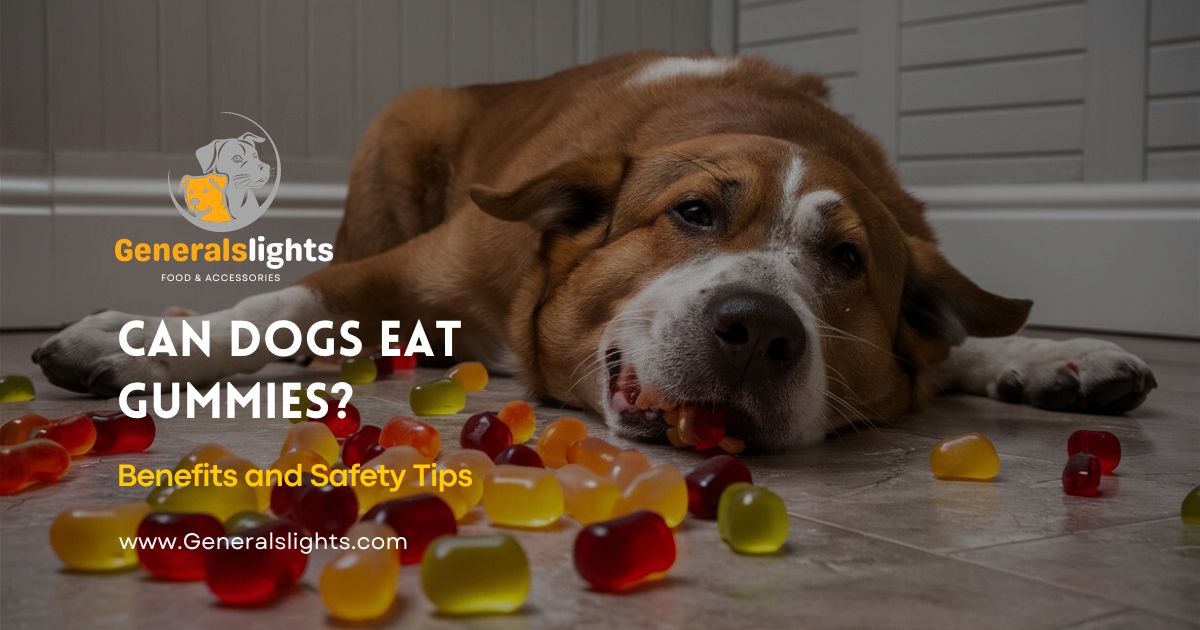Can Dogs Eat Gummies? refers to the question of whether gummy candies are safe for dogs to consume. Gummies are chewy, sugary treats popular among humans. However, they might not be the best choice for our canine companions.
Imagine giving your dog a colorful gummy bear and watching them enjoy it. It might seem harmless, but that small treat can have hidden dangers. Understanding what’s safe for your pet is crucial for their health and safety.
Can Dogs Eat Gummies? The simple answer is no. Gummies contain sugar and sometimes harmful ingredients like xylitol. These can cause serious health problems for dogs, so it’s important to keep such treats away from them.
Can Dogs Eat Gummy Bears? Vet-Reviewed Nutrition Facts & Info
Gummy bears and similar sugary treats are tempting for us, but they don’t offer any nutritional benefit for dogs. They are filled with refined sugar and artificial sweeteners which are harmful to your dog. High levels of sugar can lead to obesity and dental issues. Moreover, many gummy candies contain xylitol, a sugar substitute that is extremely toxic to dogs, even in small amounts. This sweetener can cause severe health issues like liver failure and hypoglycemia.
Why Can’t Dogs Eat Gummy Bears?
Gummy bears are not suitable for dogs primarily because of their high sugar content. Excess sugar in a dog’s diet can lead to weight gain, diabetes, and other serious health conditions. Additionally, the sticky and chewy nature of gummies can adhere to their teeth, contributing to tooth decay and poor oral health.
Dangers of Feeding Gummy Bears to Dogs
Feeding your dog gummy bears exposes them to several health risks. The artificial sweeteners and additives used in these candies are not safe for dogs. Even a small amount can disrupt your dog’s digestive health and lead to symptoms like vomiting and diarrhea. Gummy candies are also a choking hazard due to their chewy texture, which can obstruct your dog’s airways if they are not chewed properly.
Dangers of Sugar and Xylitol for Dogs

Sugar and xylitol are two main ingredients in gummies that pose risks to dogs. Sugar is a major contributor to obesity, which can lead to other health issues like diabetes and heart disease. It also negatively impacts their oral health, leading to cavities and gum disease.
Sugar
Sugar in candies affects dogs much like it does in humans but often with more severe consequences. Excessive sugar intake can result in weight gain, which strains their joints and can lead to arthritis over time. Additionally, sugary treats do not provide any nutritional benefits and can displace more nutritionally balanced foods from their diet.
Xylitol
Xylitol is highly toxic to dogs and can be found in many sugar-free candies, including gummies. Even a tiny amount of xylitol can cause a rapid drop in your dog’s blood sugar levels, leading to symptoms like lethargy, tremors, and even seizures. This substance can also cause liver damage, which might not be immediately apparent but can be life-threatening.
Choking Hazards
The chewy texture of gummy candies poses a choking hazard for dogs. If a dog tries to swallow a gummy bear whole, it could get stuck in their throat, blocking their airway. This risk is heightened if your dog tends to gulp their food without chewing properly.
What to Do If Your Dog Ate Gummy Bears

If your dog has consumed gummy bears, taking immediate action is crucial. Removing any remaining candies from their reach is the first step. Calling your vet or an emergency veterinary service is essential to get professional guidance. Do not attempt to induce vomiting on your own, as this can sometimes make the situation worse.
Immediate Steps to Take
As soon as you realize your dog has eaten gummies, assess the situation. Determine how many gummies were consumed and check if they contained xylitol or other harmful ingredients. Contact your vet to discuss the best course of action, which might include visiting the clinic for further evaluation.
Signs and Symptoms of Gummy Poisoning in Dogs
Watch for signs of poisoning, such as vomiting, diarrhea, and lethargy. If your dog shows symptoms like tremors or uncoordinated movements, this could indicate a more severe reaction to the artificial sweeteners in the gummies. Early intervention is key to preventing more severe complications.
When to Contact Your Vet for Advice
Always contact your vet if you suspect your dog has ingested gummy bears. Rapid response can prevent serious health issues. Your vet will provide instructions based on the type and amount of gummies consumed and your dog’s overall health condition.
Can Dogs Eat Recreational Gummy Bears? Risks & Solutions

Recreational gummy bears, like those found at parties, are just as harmful to dogs as regular gummy candies. They contain the same harmful ingredients, including sugary substances and artificial sweeteners.
What Sugar Does to Dogs
Sugar can lead to several health issues in dogs, including obesity, diabetes, and tooth decay. High sugar intake disrupts their balanced diet and contributes to weight gain, which can result in long-term health problems.
Tooth Decay
Sugary treats like gummy bears contribute significantly to tooth decay. When sugar is left on a dog’s teeth, it feeds harmful bacteria that cause plaque and tartar buildup. Regular brushing helps, but avoiding sugary snacks is the best way to maintain oral health.
Digestive Issues
Gummy bears can cause digestive issues such as diarrhea and stomach upset in dogs. The artificial ingredients and high sugar content can irritate their digestive tract, leading to discomfort and health problems.
Obesity
Consuming sugary treats like gummy bears contributes to obesity in dogs. Excess calories from these treats add up quickly, leading to weight gain and associated health issues. Keeping your dog on a healthy diet is crucial for their overall well-being.
What About Sugar-Free Gummy Bears?

While sugar-free gummy bears might seem like a healthier option, they can be even more dangerous due to the presence of xylitol. This sweetener, although free from sugar, is highly toxic to dogs.
Why Are Sugar-Free Gummies Dangerous?
Sugar-free gummies often contain xylitol, which is extremely harmful to dogs. Even small amounts of this sweetener can cause severe health problems, such as liver failure and hypoglycemia. Always check the ingredient list before giving any food item to your dog.
Healthy Alternatives to Gummy Bears
Instead of gummy candies, opt for healthy treats that provide real benefits to your dog’s health. There are many nutritious options available that are both safe and enjoyable for your pet.
Sweet Treats Your Dog Can Enjoy
Fresh fruits like bananas, blueberries, and watermelon are excellent alternatives to gummy bears. These treats are rich in vitamins and minerals, providing essential nutrients while being safe for your dog.
What Healthy Gummies Should I Give My Dog?
If you want a gummy-like treat for your dog, look for options specifically designed for pets, such as those with CBD oil or pet-safe ingredients. These treats are formulated to be safe and beneficial, offering a healthy snack without harmful additives.
Can Dogs Eat Gummies? Nutrition and Digestibility

Gummies are not suitable for dogs due to their poor nutritional value and digestibility. They do not offer any nutritional benefits and can be difficult for dogs to process.
Nutrition Facts of Gummies
Gummies are primarily composed of sugars and artificial ingredients, which do not contribute positively to a dog’s diet. They lack necessary vitamins and minerals, making them a poor choice for your pet’s nutritional needs.
Taste and Digestibility
While gummies might be appealing in taste, they are not easy for dogs to digest. Their artificial components and high sugar content can lead to digestive problems and are not suitable for regular consumption.
Feeding Frequency
Gummies should never be a regular part of your dog’s diet. Even occasional treats can cause health issues, making it important to stick to healthy treats that support your dog’s overall wellness.
Allergic Risks
Gummies can trigger allergic reactions in some dogs due to their ingredients. Symptoms may include itchiness, vomiting, or diarrhea. Always observe your dog after introducing new treats and consult your vet if any adverse reactions occur.
Similar Toxic Products to Avoid
Several other treats and snacks pose similar risks to dogs as gummy candies. It’s essential to be aware of these to keep your pet safe.
How Many Gummies Can Dogs Eat?
Even a small number of gummy bears can be harmful to dogs. The toxicity depends on the type and quantity ingested, but it’s best to avoid giving them altogether to prevent any risk.
Common Misconceptions About Gummies
Some people might think that sugar-free candies or gummies are safe for dogs. This misconception is dangerous as these products often contain xylitol or other harmful ingredients.
How to Treat Gummy Poisoning in Dogs

If your dog accidentally consumes gummy bears, understanding how to handle the situation is crucial.
Symptoms and Treatment
Symptoms of gummy poisoning include vomiting, diarrhea, and lethargy. Treatment may involve inducing vomiting or administering activated charcoal, depending on the situation. Always follow your vet’s advice for the best outcome.
How Long After Eating Gummies Will a Dog Get Sick?
The onset of symptoms after consuming gummies can vary. Gummy poisoning might cause immediate reactions or could take several hours to manifest. Monitoring your dog closely and seeking veterinary advice is important for timely treatment.
FAQs
Can you give human gummies to dogs?
No, you should not give human gummies to dogs. They contain ingredients like sugar and artificial sweeteners that are harmful to dogs.
Can my dog eat fruit gummies?
No, fruit gummies are not safe for dogs. They contain sugar and possibly xylitol, which can cause health issues.
What do I do if my dog ate my gummies?
If your dog ate gummies, contact your vet immediately. They will advise on the appropriate steps based on the type and quantity ingested.
Can dogs have human gummy edibles?
No, dogs should not have human gummy edibles. These often contain toxic substances like xylitol and high levels of sugar.
What happens if my dog eats my gummy vitamins?
Gummy vitamins can be dangerous for dogs, especially if they contain xylitol. Contact your vet for advice on how to proceed.
What happens if my dog eats Haribo gummies?
Haribo gummies contain sugar and sometimes xylitol, which are toxic to dogs. Seek veterinary help to address any potential poisoning.
What happens if a dog eats sour gummies?
Sour gummies can cause digestive upset and may contain toxic ingredients like xylitol. Monitor your dog closely and consult a vet.
What candy is toxic to dogs?
Xylitol-containing candies, such as sugar-free gums and gummies, are highly toxic to dogs. Avoid giving any candy to your pet.
What happens if a dog eats a melatonin gummy?
Melatonin gummies can cause drowsiness and potentially lead to more severe symptoms. Contact your vet immediately for advice.
Can dogs eat Skittles?
No, dogs should not eat Skittles. They contain sugar and artificial colors that can cause digestive problems and toxic reactions.
What foods are toxic to dogs?
Foods toxic to dogs include chocolate, xylitol, grapes, onions, and alcohol. Always check ingredients before giving treats to your dog.
What if I give my dog a gummy bear?
Gummy bears are not safe for dogs due to their sugar and artificial ingredients. Avoid giving them and consult a vet if ingested.
What happens if a dog eats a bag of gummies?
If a dog eats a bag of gummies, they might experience digestive issues and symptoms of toxicity. Seek veterinary care to manage potential health risks.
Final Thoughts
Can Dogs Eat Gummies?” has a clear answer: no, dogs should not eat gummies. Gummies contain sugar and sometimes xylitol, which can be harmful to dogs. Even small amounts of these ingredients can lead to serious health problems.
It is important to choose safe and healthy treats for your dog. Always check the ingredients of any snack before giving it to your canine companion. For the best care, stick to nutritious treats designed specifically for dogs. If your dog accidentally eats gummies, contact your vet right away to ensure their safety and well-being.
Continue Learning With :
- Can Cats Eat Vienna Sausage
- Can Dogs Eat Colby Jack Cheese
- Can Cats Eat Catnip Leaves
- Can Cats Eat Tofu
- Can Dogs Eat Kimchi
- Can Cats Eat Cake
- Can Dogs Eat Chicharrones
- how long are cats pregnant

Emerson is an expert in the world of pets, specializing in understanding diverse breeds, nutrition, and health. His deep knowledge ensures your pets receive the best care, from balanced diets to top-notch health advice, keeping them at their happiest and healthiest.











